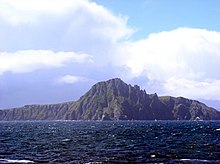Headland


A headland, also known as a head, is a coastal landform, a point of land usually high and often with a sheer drop, that extends into a body of water. It is a type of promontory. A headland of considerable size often is called a cape.[1] Headlands are characterised by high, breaking waves, rocky shores, intense erosion, and steep sea cliff.
Headlands and bays are often found on the same coastline. A bay is flanked by land on three sides, whereas a headland is flanked by water on three sides. Headlands and bays form on discordant coastlines, where bands of rock of alternating resistance run perpendicular to the coast. Bays form when weak (less resistant) rocks (such as sands and clays) are eroded, leaving bands of stronger (more resistant) rocks (such as chalk, limestone, and granite) forming a headland, or peninsula. Through the deposition of sediment within the bay and the erosion of the headlands, coastlines eventually straighten out, then start the same process all over again.
List of notable headlands
[edit]Africa
[edit]
- Cap Blanc, Mauritania
- Cap-Vert, Senegal
- Cape Agulhas, South Africa, Africa's southernmost point
- Cape Bojador, Morocco
- Cape Correntes, Mozambique
- Cape Delgado, Mozambique
- Cape Juby, Morocco
- Cape Malabata, Morocco
- Cape Spartel, Morocco
- Cape of Good Hope, South Africa
- Ras ben Sakka, Tunisia, Africa's northernmost point
Asia
[edit]- Beirut, Lebanon
- Cabo de Rama, Goa, India
- Cape Comorin or Kanyakumari, Tamil Nadu, India
- Cape Dezhnev, Russia
- Cape Engaño, Philippines
- Cape of Fire, Central Sulawesi, Indonesia
- Coconut Tree Hill, Mirissa, Sri Lanka
- Indira Point, Andaman and Nicobar Islands, India
Europe
[edit]
- Beachy Head, England
- Cabo da Roca, Portugal, the western tip of mainland Europe
- Cap Gris-Nez, France
- Cape Arkona, Germany
- Cape Emine, Bulgaria
- Cape Enniberg, Faroe Islands
- Cape Finisterre, Galicia, Spain
- Cape Greco, Cyprus
- Cape Kaliakra, Bulgaria
- Cape St. Vincent/Sagres Point, Portugal, the southwestern tip of mainland Europe
- Cape Tainaron, Greece, the southernmost tip of mainland Europe
- Cape Wrath, Scotland
- Dungeness, England
- Gibraltar, British Overseas Territory
- Great Orme, Wales
- Land's End, Cornwall, England
- Mull of Kintyre, Scotland
- North Cape, Norway, the northern tip of mainland Europe
- Pointe du Raz, France
- St Bees Head, UK, the most westerly point of northern England
North America
[edit]
Canada
[edit]- Cape Chidley, Newfoundland and Labrador/Nunavut
- Cape Columbia, Nunavut, Canada's northernmost point
- Cape Freels, Newfoundland and Labrador
- Cape Norman, Newfoundland and Labrador
- Cape Spear, Newfoundland and Labrador, Canada's easternmost point
- Cape Tormentine, New Brunswick
- Leslie Street Spit, Toronto, Ontario - man made landform
Greenland
[edit]- Cape Farewell, Greenland's southernmost point
- Cape Morris Jesup, Greenland's northernmost point
Mexico
[edit]- Cabo San Lucas, Baja California Sur, Mexico
United States
[edit]- Cape Ann, Massachusetts
- Cape Canaveral, Florida
- Cape Charles, Virginia
- Cape Cod, Massachusetts
- Cape Disappointment, Washington
- Cape Fear, North Carolina
- Cape Flattery, Washington
- Cape Hatteras, North Carolina
- Cape Henlopen, Delaware
- Cape Henry, Virginia
- Cape May, New Jersey
- Cape Mendocino, California
- Cape Prince of Wales, Alaska
- Cascade Head, Oregon
- Heceta Head, Oregon
- Hilton Head, South Carolina
- Marin Headlands, California
- Mount Mitchill, New Jersey
- North Shore, Lake Superior, Minnesota
- Point Reyes, California
- West Quoddy Head, Maine
Oceania
[edit]


Australia
[edit]- Cape Leeuwin, Western Australia
- Cape York Peninsula, Queensland
- South East Cape, Tasmania
- South West Cape, Tasmania
- Sydney Heads, New South Wales
- Barrenjoey, New South Wales
New Zealand
[edit]United States (Hawaii)
[edit]- Diamond Head, Hawaii
- Koko Head, Hawaii
South America
[edit]
- Cape Froward, Chile
- Cape Horn, Chile, South America's southernmost point
- Cape Virgenes, Argentina
See also
[edit]References
[edit]- ^ Whittow, John (1984). Dictionary of Physical Geography. London: Penguin, 1984, pp. 80, 246. ISBN 0-14-051094-X.

